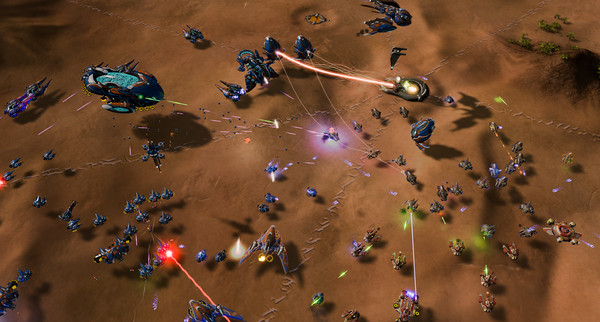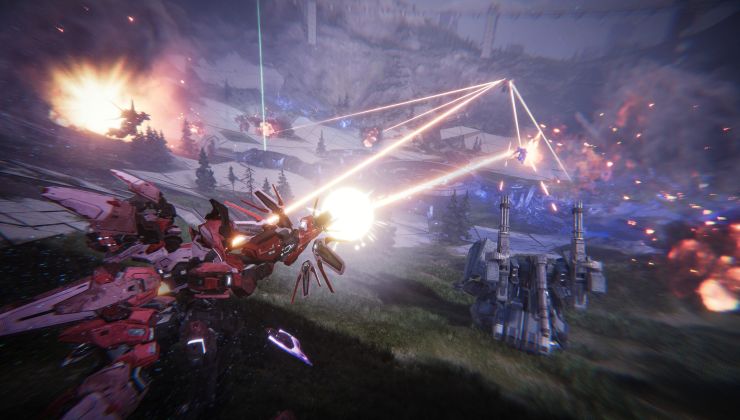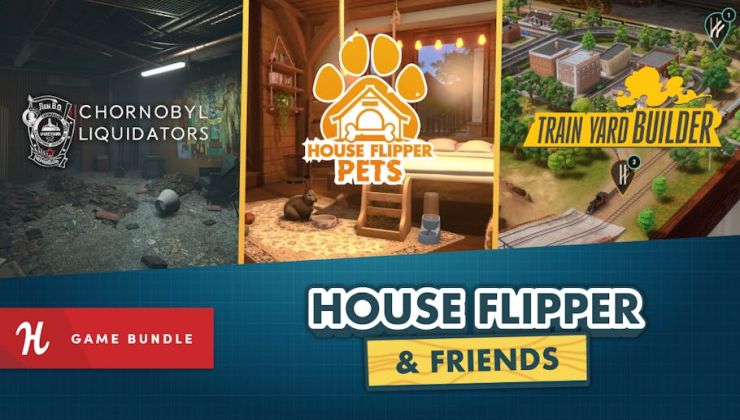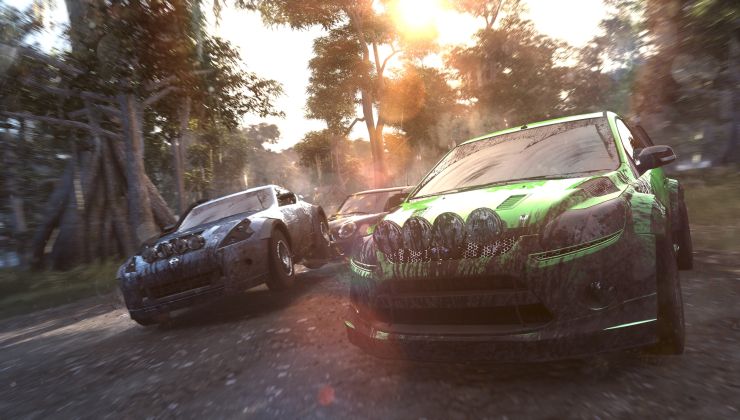We've been waiting quite a while for any real news on the Linux port of Ashes of the Singularity: Escalation [Official Site]. While we still don't know when, we do know it's still happening.

It's nothing big, as I said in the title not to get any major hopes up. Speaking in the Steam forum for Star Control: Origins, which should also be coming to Linux, Stardock CEO said this:
So just an update.
Mac isn't looking as viable. We really thought they'd embrace Vulkan.
Right now, our RTS, Ashes of the Singularity, is ahead in the queue. We just need more engineering resources. :)
The nice thing about Linux is that it provides a fairly neutral platform from which you can then go to other platforms.
Just something I thought that was quite interesting, which I'm sure some of you would also appreciate seeing. As a big fan of RTS games, it's been on my radar for some time. At some point someone gifted it to me, so I would really like to try it.
"The nice thing about Linux is that it provides a fairly neutral platform from which you can then go to other platforms."
What does it means? The game is developped on Linux? If so, it should be well known in the industry. Ok, Ashes of the Singularity is not a perfect example, but am I wrong to think that it should make things easier when it comes to Linux ports too?
So programming a piece of software on Linux using the native APIs makes it a lot easier to port onwards onto other platforms like Windows or macOS.
I'd still like to play this one for myself too (though I already have a copy, courtesy of my last video card purchase, I've never installed it even in wine).
Force is strong with this one.
This:Just my personal experience. It's quite easy to lock yourself into Windows (DirectX) and macOS (Metal, Cocoa), but basically everything on Linux is cross platform by design, and we have both OpenGL and Vulkan. So it is much easier to port Linux applications to macOS, Android, and even Windows, than the other way round.
"The nice thing about Linux is that it provides a fairly neutral platform from which you can then go to other platforms."
What does it means? ...
Programming on Linux is also quite a pleasant experience, even though the lack of Visual Studio and some more specialized commercial tools remains an issue. Graphical design, 3D modeling, and video editing tools is a bigger problem for game development on Linux. At least if you are developing a game from scratch, and not making a port.
Also Apple really shot themselves in the foot by deprecating OpenGL (and OpenCL), and trying to force developers onto Metal. I really think they are overestimating how big they are and how much leverage they have.
There has been talk of games being streamed to consoles to bypass their subpar hardware, while the games would actually run "in the cloud". Linux runs on most servers and the M$ pricing model is horrible for servers(per core, per CPU socket, really complicated nonsense). Linux is the perfect OS for hosting those players, which would leave only the control scheme to be refined for controllers.
I know there is butthurt in Mac forums right now. And thought of that is making me smile. Those tears, ummy yammee! I fast on no carbs diet, but those tears are so sweet, like round fat fingers covered in doughnut chocolate of rich fan boys who have more money than sense.
Hum, I can certainly empathize with them. I would certainly prefer all games to be as widely available as possible. Maybe they could use MoltenVK in the future?
That dev statement is nice, I know what they mean, but I would certainly love them to elaborate a bit on this, as this would probably be a good argument for porting games to Linux.
Edit: I'd like to play this one as well, though I think I got it in a monthly some time ago. It would be nice to test with my soon-to-be-installed-in-a-new-pc new R9 Fury :D
Last edited by MayeulC on 18 Jun 2018 at 8:02 pm UTC
My guess is they haven't really put any real work into it, maybe just tinkered with the idea while focusing on other stuff. But they're welcome to prove me wrong, release a port and I will buy it. Not getting a penny otherwise.
Too bad about Mac, it could have been a great gaming platform if Apple didn't ruin it, many games were even ported over long before Linux became popular. Maybe there's hope with MoltenVK yet?
or if there are features they need that Metal simply doesn't support.
MoltenVK is missing tessellation support and some other features: https://github.com/KhronosGroup/MoltenVK/blob/master/Docs/MoltenVK_Runtime_UserGuide.md#limitations
Last edited by Shmerl on 18 Jun 2018 at 10:18 pm UTC
Graphical design, 3D modeling, and video editing tools is a bigger problem for game development on Linux. At least if you are developing a game from scratch, and not making a port.Actually, Linux is the defacto standard in the movie (post-production/VFX) industry, and basically every AAA blockbuster movie since the early 2000's up to today have been made on Linux workstations and rendered on Linux servers. Because of this, all relevant commercial 3D suites are available for Linux (except 3dsmax, but who cares.. even game studios use Maya nowadays). 2D (compositing and grading in this context) is done on Linux aswell. Of course Photoshop-ninjas won't change, but Krita is used by some studios and artists for concept art/graphics/textures, and even primarily game-dev apps such as Substance Painter is available for Linux (because it wants appeal to the VFX industry). Video editing, like sound design, have a harder time moving to Linux, even though commercial offerings are available. Commercial game engines and editors exists in some form (I guess Unity is in better shape than UE4.. don't know about CryEngine or Unigine).
In open source, we have Blender, Krita, GIMP (which is very capable despite its stigma), Ardour, Godot, Shotcut, Darktable, etc.
The notion that Linux is not a platform for graphical/"creative" work needs to stop. It is simply not true anymore, and haven't been for well over a decade. Next time you watch "Avengers" or "Star Wars" or whatever, enjoy the thought that all the CG/VFX was powered by Tux :)
or if there are features they need that Metal simply doesn't support.
MoltenVK is missing tessellation support and some other features: https://github.com/KhronosGroup/MoltenVK/blob/master/Docs/MoltenVK_Runtime_UserGuide.md#limitations
Yes, mostly because Metal doesn't support them. My wording was poor - I wondered if they might use MoltenVK, or if they can't because of lack of feature support (because of not being able to map those features to Metal). For example, geometry shaders are used quite a bit in cascaded shadow mapping, which I would've thought to be useful here, depending on the camera angle intended.
Just wondering if that might be behind why they think Mac might not be viable. Too much time & effort to rework their engine around the problem for now. If that's the case, I'm sure Khronos would be interested to hear, if for no other reason than as extra data points for the portability initiative.
Guess we'll find out eventually.
Metal supports them, but they don’t map cleanly from Vulkan.
I’m sure they just don’t want to write yet another backend. They were hoping to use their existing Vulkan one.
The fact they have one, and still no Linux support is a sign of low engineering resources.
Last edited by Jmsnz on 18 Jun 2018 at 11:15 pm UTC
Nevermind, seems they know. Didn't know that MoltenVK had critical missing features, figures. Maybe progress will be made eventually.
Last edited by TheRiddick on 18 Jun 2018 at 11:31 pm UTC
Graphical design, 3D modeling, and video editing tools is a bigger problem for game development on Linux. At least if you are developing a game from scratch, and not making a port.Actually, Linux is the defacto standard in the movie (post-production/VFX) industry, and basically every AAA blockbuster movie since the early 2000's up to today have been made on Linux workstations and rendered on Linux servers. Because of this, all relevant commercial 3D suites are available for Linux (except 3dsmax, but who cares.. even game studios use Maya nowadays). 2D (compositing and grading in this context) is done on Linux aswell. Of course Photoshop-ninjas won't change, but Krita is used by some studios and artists for concept art/graphics/textures, and even primarily game-dev apps such as Substance Painter is available for Linux (because it wants appeal to the VFX industry). Video editing, like sound design, have a harder time moving to Linux, even though commercial offerings are available. Commercial game engines and editors exists in some form (I guess Unity is in better shape than UE4.. don't know about CryEngine or Unigine).
In open source, we have Blender, Krita, GIMP (which is very capable despite its stigma), Ardour, Godot, Shotcut, Darktable, etc.
The notion that Linux is not a platform for graphical/"creative" work needs to stop. It is simply not true anymore, and haven't been for well over a decade. Next time you watch "Avengers" or "Star Wars" or whatever, enjoy the thought that all the CG/VFX was powered by Tux :)
I still recall all the articles about ILM ditching SGI for Linux machines oh so long ago. Also know WETA used it for Lord of the Rings. And those two are a huge majority of who studios hire for CGI.
Now if the stigma of 'Linux is hard' would end for the desktop so I did not have to defend myself for using it for work, where everyone has a mac or Windows laptop. Though weirdly I hear more issues with the mac users than the Windows ones..
Stuff like 'my battery drained because it didn't suspend and now it won't start up..' is pretty common.
Love it, still have this game on ice from a past Humble monthly.I just checked to see if I do as well, and found 3 other games that have a Linux version that I didn't know about.
I used to be a C++ developer in a large company, never on games, but we would always develop on Unix and port our applications to Windows or whatever after. This approach was to some extent done for games in the mid 1990's. I worked in Dallas Texas in the mid 1990s, and my American colleagues had friends at ID Software down the road, so we were given an unofficial Unix version of Doom around the time it was initially released. After working hours, we would often have 6 or more player games of Doom on our office network of SUN SparcStations (expensive Unix development workstations). I was told that the Unix version was there because ID developed the game on Unix, before porting it to DOS and Windows. So it would be ironic if some modern game development moved to Linux.












 How to set, change and reset your SteamOS / Steam Deck desktop sudo password
How to set, change and reset your SteamOS / Steam Deck desktop sudo password How to set up Decky Loader on Steam Deck / SteamOS for easy plugins
How to set up Decky Loader on Steam Deck / SteamOS for easy plugins
See more from me